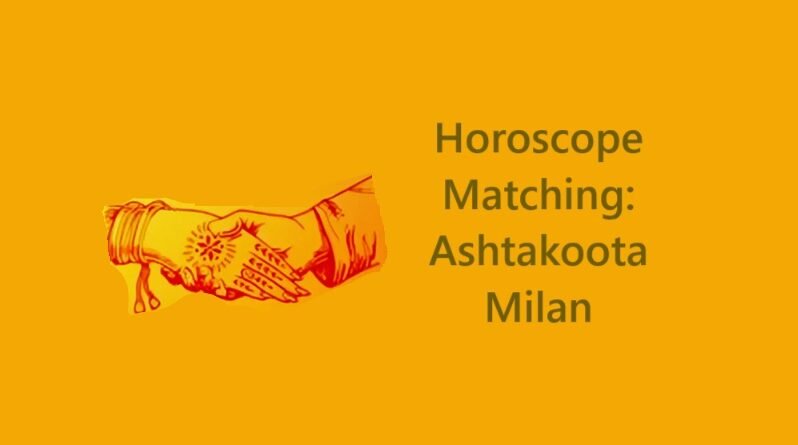Horoscope Matching: Ashtakoota Milan
Introduction
Horoscope matching, also known as Kundali matching or Gun Milan, is an ancient Vedic astrology practice that analyzes the compatibility of two individuals before marriage. In Indian culture, astrology plays a crucial role in determining whether a prospective couple will have a harmonious and prosperous life together. This process involves comparing the birth charts (Kundali) of both partners to examine their compatibility based on various astrological factors.
Importance of Horoscope Matching in Marriage
Marriage is considered a sacred union, and horoscope matching helps ensure the couple’s emotional, mental, and physical compatibility. The primary goal of this process is to prevent conflicts, ensure prosperity, and promote marital bliss. It is believed that aligning the planetary positions and ensuring harmony in the couple’s horoscopes can lead to a successful and happy marriage.
Key Elements of Horoscope Matching: Ashtakoota Milan
Horoscope matching is based on various astrological parameters, with the most common method being Ashtakoota Milan. It involves evaluating eight factors, which collectively assess different aspects of compatibility. These are:
1. Varna (Caste) – 1 Point
This criterion assesses the spiritual compatibility and ego levels of both partners. The four Varnas are:
- Brahmin (Highest Spiritual Level)
- Kshatriya (Leadership & Valor)
- Vaishya (Commerce & Trade)
- Shudra (Service & Assistance)
2. Vashya (Control & Influence) – 2 Points
It determines how much control one partner has over the other, ensuring a balance of power in the relationship.
3. Tara (Birth Star Compatibility) – 3 Points
This factor evaluates the health, well-being, and lifespan of the couple.
4. Yoni (Sexual Compatibility) – 4 Points
This parameter assesses sexual attraction and physical compatibility, which is crucial for a happy married life.
5. Graha Maitri (Planetary Friendship) – 5 Points
It signifies the intellectual and mental compatibility between the partners based on their planetary positions.
6. Gana (Nature Compatibility) – 6 Points
It classifies people into three categories:
- Deva (Divine) – Soft-natured, polite, spiritual
- Manushya (Human) – Balanced, practical, ambitious
- Rakshasa (Demonic) – Aggressive, dominant, fearless Compatibility between these groups determines harmony in the marriage.
7. Bhakoot (Love & Financial Prosperity) – 7 Points
This factor analyzes emotional bonding, financial stability, and mutual understanding.
8. Nadi (Genetic Compatibility) – 8 Points
Nadi represents the health and progeny aspect of marriage. It is considered the most crucial parameter, and couples with the same Nadi are often advised against marriage due to potential health issues in their offspring.
Scoring System
The total score for these eight factors is 36 points. The compatibility is classified as follows:
- 32-36 Points – Excellent Match (Highly Compatible)
- 25-31 Points – Good Match (Marriage Recommended)
- 18-24 Points – Average Match (Marriage Possible with Remedies)
- Below 18 Points – Poor Match (Marriage Not Recommended)
Additional Factors in Horoscope Matching
Apart from Ashtakoota Milan, astrologers consider other aspects for deeper compatibility analysis:
1. Mangal Dosha (Kuja Dosha)
Mangal Dosha arises due to the placement of Mars (Mangal) in certain houses of the birth chart. A Manglik individual may experience marital discord, financial issues, or even separation. However, remedies such as performing pujas, fasting, or marrying another Manglik can mitigate these effects.
2. Dasha Analysis
Dasha analysis helps determine the planetary influences on the couple’s life during different periods. A well-aligned Dasha can indicate long-lasting happiness, whereas conflicting Dashas can lead to turmoil.
3. Navamsa Chart (D-9 Chart)
This is a secondary chart used in Vedic astrology to analyze marital bliss and longevity. It helps in understanding hidden aspects of compatibility that may not be evident in the main birth chart.
Remedies for Horoscope Mismatches
If the horoscope match is not ideal, astrologers often suggest remedies to mitigate any negative influences. Common remedies include:
- Performing specific Vedic rituals and pujas
- Wearing gemstones aligned with favorable planets
- Observing fasting and reciting mantras
- Conducting charitable acts or donations
Modern Perspectives on Horoscope Matching
In today’s world, many couples consider horoscope matching as one of several factors in choosing a life partner. While traditional astrology provides insights, modern relationships thrive on mutual understanding, communication, and emotional connection. Many people use horoscope matching as guidance rather than a strict rule.
Conclusion
Horoscope matching is a centuries-old practice rooted in Vedic astrology, helping couples build strong and harmonious relationships. While it provides valuable insights into compatibility, it is essential to balance astrological predictions with personal understanding and mutual respect. Whether one believes in astrology or not, a successful marriage ultimately depends on love, trust, and commitment between partners.

